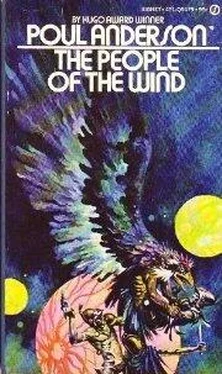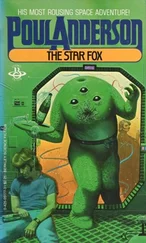“Otherwise the pre-Ythrian must have appeared fairly similar to Terran birds.” Pictures of various hypothetical extinct creatures went by. “It developed an analogous water-hoarding system — no separate urination — which saved weight as well as compensating for evaporative losses from the antlibranchs. It likewise developed light bones, though these are more intricate than avian bones, built of amarvelously strong two-phase material whose organic component is not collagen but a substance carrying out the functions of Terra-mammalian marrow. The animal did not, however, further ease its burdens by trading teeth for a beak. Many Ythrian ornithoids have done so, for example the uhoth, hawklike in appearance, doglike in service. But the pre-sophont remained an unspecialized dweller in wet jungles.
“The fact that the young were born tiny and helpless — since the female could not fly long distances while carrying a heavy fetus — is probably responsible for the retention and elaboration of the digits on the wings. The cub could cling to either parent in turn while these cruised after food; before it was able to fly, it could save itself from enemies by clambering up a tree. Meanwhile the feet acquired more and more ability to seize prey and manipulate objects.
“Incidentally, the short gestation period does not mean that the Ythrian is born with a poorly developed nervous system. The rapid metabolism of flight affects the rate of fetal cell division. This process concentrates on laying down a body pattern rather than on increasing the size. Nevertheless, an infant Ythrian needs more care, and more food, than an infant human. The parents must cooperate in providing this as well as in carrying their young about. Here we may have the root cause of the sexual equality or near equality found in all Ythrian cultures.
“Likewise, a rapid succession of infants would be impossible to keep alive under primitive conditions. This may be a reason why the female only ovulates at intervals of a year — Ythri’s is about half of Terra’s — and not for about two years after giving birth. Sexuality does not come overtly into play except at these times. Then it is almost uncontrollably strong in male and female alike. This may well have given the territorial instinct a cultural reinforcement after intelligence evolved. Parents wish to keep their nubile daughters isolated from chance-met males while in heat. Furthermore, husband and wife do not wish to waste a rich, rare experience on any outsider.
“The sexual cycle is not totally rigid. In particular, grief often brings on estrus. Doubtless this was originally a provision of nature for rapid replacement of losses. It seems to have brought about a partial fusion of Eros and Thanatos in the Ythrian psyche which makes much of the race’s art, and doubtless thought, incomprehensible to man. An occasional female can ovulate at will, though this is considered, an abnormality; in olden days she would be killed, now she is generally shunned, out of dread of her power. A favorite villain in Ythrian story is the male who, by hypnosis or otherwise, can induce the state. Of course, the most important manifestation of a degree of flexibility is the fact that Ythrians have successfully adapted their reproductive pattern, like everything else, to a variety of colonized planets.”
“Me, I think it’s more fun being human,” Rochefort said.
“I don’t know, sir,” Wa Chaou replied. “Superficially the relationship between the sexes looks simpler than in your race or mine; you’re either in the mood or you’re not, and that’s that. I wonder, though, if it may not really be more subtle and complicated: than ours, even more basic to the whole psychology.”
“But to return to evolution,” the lecturer was saying. “It seems that a major part of Ythri underwent something like the great Pliocene drought in’ Terra’s Africa. The ornithoids were forced out of dwindling forests onto growing savannahs. There they evolved from carrion eaters to big-game hunters in a manner analogous to pre-man. The original feet became hands, which eventually started making tools. To support the body and provide locomotion on the ground, the original elbow claws turned into feet, the wings that bore them became convertible to legs of a sort.
“Still, the intelligent Ythrian remained a pure carnivore, and one which was awkward on land. Typically, primitive hunters struck from above, with spears, arrows, axes. Thus only a few were needed to bring down the largest beasts. There was no necessity to cooperate in digging pits for elephants or standing shoulder to shoulder against a charging lion. Society remained divided into families or clans, which seldom fought wars but which, on the other hand, did not have much contact of any sort.
“The revolution which ended the Stone Age did not involve agriculture from the beginning, as in the case of man. It came from the systematic herding, at last the domestication, of big ground animals like the maukti, smaller ones like the long-haired mayaw. This stimulated the invention of skids, wheels, and the like, enabling the Ythrian to get about more readily on the surface. Agriculture was invented as an ancillary to ranching, an efficient means of providing fodder. The food surplus allowed leisure for travel, trade, and widespread cultural intercourse. Hence larger, complex social units arose.
“They cannot be called civilizations in a strict sense, because Ythri has never known true cities. The, mobility of being winged left no necessity for crowding together in order to maintain close relationships. Granted, sedentary centers did appear — for mining, metallurgy, and other industry; for trade and religion; for defense in case the group was defeated by another in aerial battle. But these have always been small and their populations mostly floating. Apart from their barons and garrisons, their permanent inhabitants were formerly, for the main part, wing-clipped slaves — today, automated machines. Clipping was an easy method of making a person controllable; yet since the feathers could grow back, the common practice of promising manumission after a certain period of diligent service tended to make prisoners docile. Hence slavery became so basic to pre-industrial Ythrian society that to this day it has not entirely disappeared.”
Well, we’re reviving it in the Empire, Rochefort thought For terms and under conditions limited by law; as a punishment, in order to get some social utility out of the criminal; nevertheless, we’re bringing back a thing the Ythrians are letting die. How more moral are we than they? How much more right do we have?
He straightened in his chair. Man is my race.
A willowy blonde with the old-fashioned Esperancian taste for simplicity in clothes, Eve Davisson made a pleasing contrast to Philippe Rochefort, as both were well aware. He was a tall, rather slender young man, his bearing athletic, his features broad-nosed, full-lipped, and regular, his hair, kinking itself into a lustrous black coif over the deep-brown skin. And he stretched to the limit the tolerance granted officers as regards their dress uniforms — rakishly tilted bonnet bearing the sunburst of Empire, gold-trimmed blue tunic, scarlet sash and cloak, snowy trousers tucked into low boots of authentic Terran beef-leather.
They sat in an intimate restaurant of Fleurville, by a window opening on gardens and stars. A live sonorist played something old and sentimental; perfumed, slightly intoxicant vapors drifted about; they toyed with hors d’oeuvres and paid more serious attention to their champagne. Nonetheless she was not smiling.
“This world was settled by people who believed in peace,” she said. Her tone mourned rather than accused. “For generations they kept no armed forces, they relied on the good will of others whom they helped.”
Читать дальше











